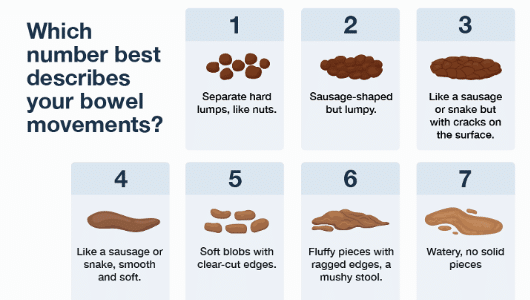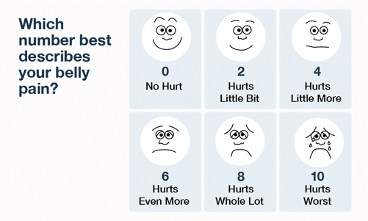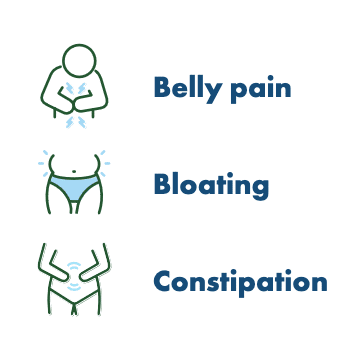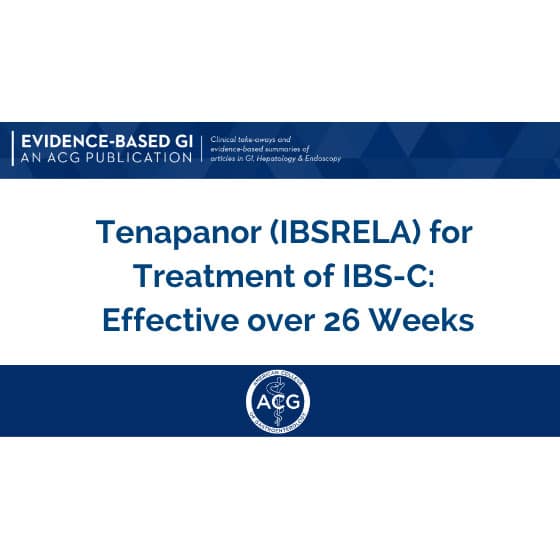If you are suffering with constipation, could it be IBS-C? How would you know?
Do you have constipation that keeps coming back? Is it possible that you have other symptoms that you may not realize could be related to your constipation? Certain symptoms you may be experiencing could be pointing to a condition called IBS-C, or irritable bowel syndrome with constipation.

Goals and actions
This article will cover several symptoms that are commonly associated with constipation. If these symptoms sound familiar to you, talk to your doctor. Any additional information and clarity that you can provide could help your doctor help you get a faster and more accurate result. You can help by “Talking Symptoms.”
How to “Talk Symptoms”
Starting the conversation; “I am experiencing constipation and….” :
In a case like yours, most conversations about constipation start and end there; “I am still experiencing constipation.” Many also end with frustration at the lack of answers. Don’t fall into that trap. Be sure to share any additional symptoms that you are experiencing with your doctor.

Providing crucial information to your doctor; “I am experiencing constipation and I’m also experiencing other symptoms”:
Some of the key symptoms associated with constipation can include:1,2
- bloating, abdominal (belly) discomfort
- abdominal pain,
- infrequent stools associated with straining and a feeling of incomplete emptying.
- There is also a time component here. Has this been going on for more than 3 months?
If you have any of these symptoms and you tell your doctor about them, they are more likely to check you for IBS-C.
What’s in a number?
It turns out a lot! Let’s discuss 2 different numbers that can let your doctor know what you are going through. The first is a stool scale. Knowing what your stool looks like and how easy or hard it is to pass gives the doctor a key measure of your constipation. It can be embarrassing to talk about “poop,” but the more detail you can give to your doctor, the better they will understand you. See the scale below to choose your number.2

Another number to determine and let your doctor know about is your pain score. It is a scale from 0 through 10 that in this case relates to your belly pain. Look at the chart and determine what the highest number your belly pain has reached. Any belly pain in combination with constipation is a symptom that your doctor will take very seriously and may trigger them to ask you additional questions about your condition.3

Once you have determined these numbers, remember to share them with your doctor.
Speaking your doctor’s language
Your doctor will try to put your symptoms together to understand your condition. They may consider the following combinations of symptoms as signs of IBS-C. It may help you and your doctor if you use some of the example phrases below when talking about your symptoms in greater detail. 4
- Abdominal (belly) pain that occurs on average, at least once a week, within the last 3 months
- Abdominal pain that lessens when you have a bowel movement
- Noticeable changes in how often you have a bowel movement or its appearance (see numbers above)
AND
- Hard or lumpy stool at least 25% of the time
- Loose or watery stool less than 25% of the time
- Straining when having a bowel movement
- Bloating
- Suffering from gas pain
- Feeling like you have not completely emptied your bowel after a movement
Key takeaway:
Know your symptoms and numbers from the charts above and be sure to discuss them with your doctor.
Any information that you can provide beyond “constipation” will help your doctor treat you more accurately.
References
- Lacy BE et al. Bowel Disorders. Gastroenterol. 2016;150:1393-1407.
- Lacy BE et al. ACG Clinical Guideline: Management of Irritable Bowel Syndrome. Am J Gastroenterol. 2021;116(1):17-44.
- Spiegel et al. Measuring Irritable Bowel Syndrome Patient-Reported Outcomes With an Abdominal Pain Numeric Rating Scale. Alimentary Pharmacology and Therapeutics. 2009;30:1159-1170.
- Lacy BE et al. Rome Criteria and a Diagnostic Approach to Irritable Bowel Syndrome. Journal of Clinical Medicine. 2017; 6:99. doi:10.3390/jcm6110099
The information on this site is not intended to diagnose medical conditions or take the place of talking to a qualified healthcare provider about medical conditions or treatment options.
Ironwood® and its three-leaf design are registered trademarks of Ironwood Pharmaceuticals, Inc.
© 2023 Ironwood Pharmaceuticals, Inc. All rights reserved.
Listen to our
latest Podcast!





